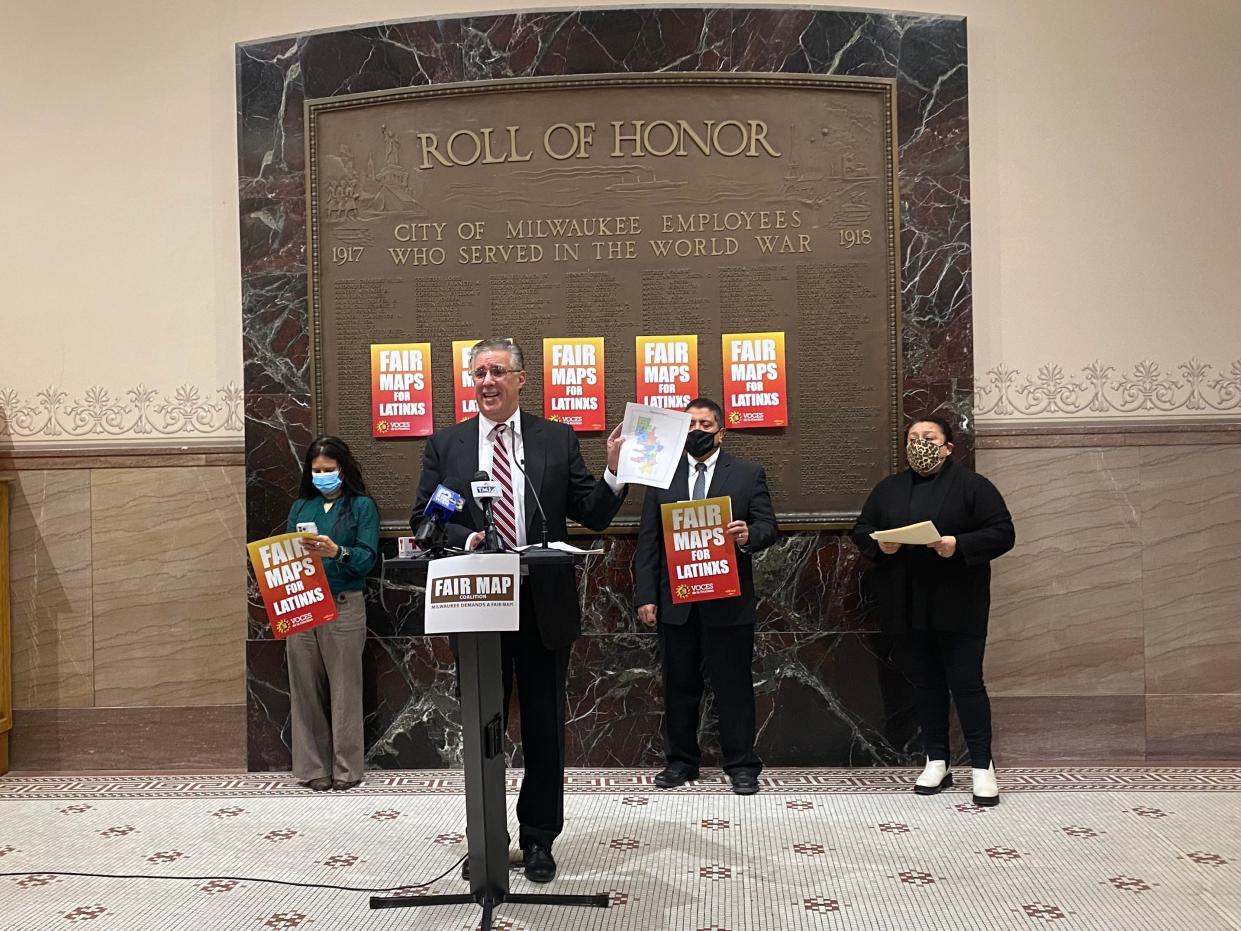Latino advocates call on the Milwaukee Common Council to pause redistricting, following concerns about the City Attorney's counsel

Following a Common Council committee's decision to move forward with an aldermanic map previously vetoed, Latino rights leaders rallied Friday inside Milwaukee City Hall hoping to stop re-approval of the map.
The rally was another call to pause the city's redrawing of district lines, a months-long process that has faced several revisions following concerns over Latino representation and balance.
At issue: The currently recommended "Map A" does not provide Milwaukee's Latino residents the much-desired third majority district, which advocates have argued would fairly represent the population's major growth over the last decade.
Voces de la Frontera, Forward Latino, the Hispanic Collaborative and the Wisconsin Hispanic Scholarship Foundation (also known as Mexican Fiesta) urged council members to seek outside legal advice before they make a decision on the district lines during a meeting Tuesday.
That came in the wake of committee action on the map, based on legal advice offered by City Attorney Tearman Spencer, who told the Milwaukee Journal Sentinel he personally reviewed the work of his office and stood by it: "I am confident that the advice provided was correct and complete."
But Darryl Morin, president and CEO of Forward Latino, challenged that, saying the opinion amounted to "one of numerous inaccurate and incomplete decisions and advice" from Spencer's office.
"It would not just unlawfully diminish the vote of communities that have been traditionally underserved and discriminated against, but it would also be an invitation for these communities to bring about time-consuming and costly litigation," Morin said.
In maps presented by Forward Latino and Voces de la Frontera to the council's Judiciary and Legislation Committee, the groups had hoped to rectify what they consider poor Latino representation from redistricting a decade ago and create a third majority —or at least near-majority — Latino district on the south side.
As it stands, Latinos and Hispanics represent 20.1% of the city's population and the recommended map would include only two majority Latino districts out of 15.
The committee, however, rejected the proposed maps from the groups in favor of a previously approved one, after advice from Spencer's office deemed them legally unenforceable. The city attorney's opinion said those maps would potentially violate the 1965 Voting Rights Act, as well as the Equal Protection Clause in the U.S. Constitution.
That's because, the opinion said, the maps were drawn with race being the “predominant overriding factor." The opinion referenced past court cases in which a map was found to be “so irrational on its face that it could be understood only as an effort to racially segregate voters” and in which it was “exceedingly obvious that the shape of the district, together with relevant racial demographics, was a deliberate attempt” to do so.
Morin countered: "The map is compact, it's contiguous, and it meets all legal standards and requirements."
Morin said he worked with national experts on redistricting, including the former voting rights section chief of the U.S. Department of Justice. Noting the map lines were not based on race, he said they also included data on English language proficiency, English language learners, business interests, housing, health care concerns, education and housing, among other areas.
At the rally, a list of 60 signatures supporting the groups' efforts was partially read by Ruben Burgos, president of the Wisconsin Hispanic Scholarship Foundation. It included a host of groups, and local and state officials, including state Sen. Lena Taylor, U.S. Sen. Tammy Baldwin and state Rep. Sylvia Ortiz-Velez, all Democrats.
The most recent U.S. Census showed that the city lost nearly 3% of its population during the last decade, with its white and Black populations dropping.
Nancy Hernandez, president of the Hispanic Collaborative, noted that the dip in the populations of the current Districts 11, 13 and 14 — all on the south side — were buoyed by the growth of Latino residents in those areas.
Morin said he and his organization have sought legal council to potentially challenge the map recommended by the committee. That map had previously been vetoed by former Mayor Tom Barrett, who left office last month to become U.S. ambassador to Luxembourg.
The council is to act on the map Tuesday. If approved, it would go to Acting Mayor Cavalier Johnson, who is in the position by virtue of being Common Council president. Johnson would not vote on it as a council member.
"Redistricting is supposed to ensure a voice for the disenfranchised," said Christine Neumann-Ortiz, founder and executive director of Voces de la Frontera. "I ask each Common Council member and the interim mayor: What side of history will you stand on this vote?"
Contact Vanessa Swales at 414-308-5881 or vswales@gannett.com. Follow her on Twitter @Vanessa_Swales.
Our subscribers make this reporting possible. Please consider supporting local journalism by subscribing to the Journal Sentinel at jsonline.com/deal.
DOWNLOAD THE APP: Get the latest news, sports and more
This article originally appeared on Milwaukee Journal Sentinel: Latino groups urge the Common Council to halt redistricting decision

